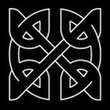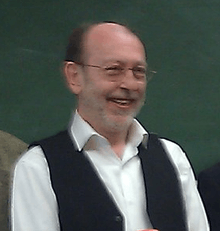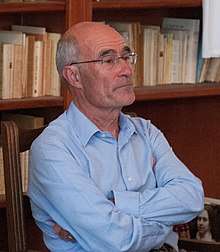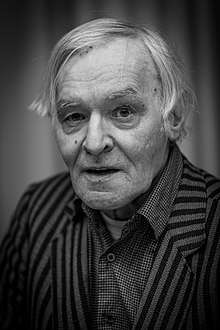GRECE
The Groupement de recherche et d'études pour la civilisation européenne ("Research and Study Group for European Civilization"), better known as GRECE (French acronym for "Greece"), is an ethno-nationalist think tank founded in 1968 to promote the ideas of the Nouvelle Droite ("New Right"). GRECE founding member Alain de Benoist has been described as its leader and "most authoritative spokesman".[1][2] Prominent former members include Guillaume Faye and Jean-Yves Le Gallou.
 | |
| Abbreviation | GRECE |
|---|---|
| Formation | 1968 |
| Founder | Alain de Benoist, Dominique Venner, Giorgio Locchi, Maurice Rollet, Pierre Vial, Jean-Claude Valla, and 34 others. |
| Type | Meta-political club |
| Purpose |
|
GRECE is deeply opposed to multiculturalism, liberal democracy, capitalism, and distinguishes itself from other national-conservative organizations in its specific rejection of Christianity and endorsement of neopaganism. The group defends a non-reactionary "conservative revolution" aiming at the rejuvenation of pan-European identity and nationalism, while supporting the preservation and separation of ethnic groups and cultures. GRECE members have created and promoted the concepts of "ethnopluralism" and "archeofuturism".
History
Background: 1958–1967
The dissolution of the neo-fascist organization Jeune Nation in 1958 and of the pro-colonial paramilitary group Organisation Armée Secrète in 1962, as well as the failures of far-right candidate Jean-Louis Tixier-Vignancour in the 1965 presidential election and of the European Rally for Liberty (REL) in the 1967 legislative election, are cited as events conducive to the foundation of GRECE and the development of its meta-political strategy.[3]
The philosophy of GRECE drew inspiration from earlier essays and theories developed by the white nationalist magazine Europe-Action (1963-66)—headed by Dominique Venner and in which Alain de Benoist worked as a journalist—, most notably Venner's manifesto Pour une critique positive ("Towards a positive criticism"), written while he was in prison in 1962. Abandoning the myth of the coup de force, Venner asserted that far-right movements had to be at the origin of a cultural and non-violent revolution, through the promotion of their ideas in the public sphere until they reach political dominance.[3][4]
Another influence can be found in the "Manifesto of the Class of '60", published by the initiators of the Federation of Nationalist Students (FEN) in 1960, far-right and pro-colonial students' organization. Committing themselves to "action of profound consequence", the authors sought to break with the "sterile activism" of violent insurrection previously espoused by Jeune Nation (1949–58). Venner and de Benoist had been active in Jeune Nation and the FEN, respectively.[5]

After the electoral failure of the European Rally for Liberty (1966–69), some members of the party, among them de Benoist helped by an informal group of FEN militants, decide to found a cultural organization to diffuse their ideas. In the 1960s, de Benoist had contributed as a writer and journalist to develop Venner's thesis on European nationalism, which served as an ideological basis for GRECE. Their theory was founded on a 'pan-racial' rather than an ethnic or civic conception of nationalism: the nations of the "Occident"—or the "white race"—had to unite within a common European empire (including Russia) as the inheritors of a single civilization.[3]
Founding and development: 1968–1978
GRECE was created in January 1968,[6] and officially launched on 17 January 1969, by European, mostly French, nationalist activists. Among the 40 founders were Alain de Benoist, Dominique Venner, Giorgio Locchi, Maurice Rollet – who became its first president –, Pierre Vial and Jean-Claude Valla.[7][note 1]
The founders of the think tank aimed at creating a meta-political laboratory of ideas that would influence mainstream right-wing parties and society at large.[9] In May 1969, they circulated an internal document advising their members not to employ "outdated language" that might associate the group with fascism, and to socialize with Europe's most important decision-makers in order to influence their policies.[10]
Jean-Yves Le Gallou joined the Cercle Pareto in 1969, a club founded by students associated with GRECE in Science Po one year earlier, followed by Guillaume Faye in 1970.[11] The think tank founded its own review in February–March 1968, Nouvelle École. Initially distributed exclusively among its members for them to debate their views in a semi-academical style, it became public in 1969. The magazine Éléments was launched as the general public showcase of GRECE in September 1973, and the publishing company Copernic was created in September 1976.[12][13][14]
During the decade that followed the creation of GRECE in 1968, the group remained mostly confidential. Members were focusing on entryist strategies to integrate mainstream political parties and public services and on the organization of conferences to influence the elites. A number of cercles de réflexion ("thinking groups") started to emerge among nationalist intellectuals from many cities of France: the "Cercle Pareto" in Science Po Paris, "Galillée" in Lyon, "Critique Réaliste" in Nantes, "Jean Médecin" in Nice, "Bertrand Russel" in Toulon, "Pythéas" in Marseille, "Erwin-de-Steinbach" and "Wimpfeling" in Strasbourg, "Stamkunde" in Lilles, "Henry de Montherland" in Bordeaux, "Erasme" in Brussels, and "Villebois-Mareuil" in Johannesburg.[13][15]
Club de l'Horloge split: 1974

Frustrated with GRECE's long-term meta-political strategy, several GRECE members, including Jean-Yves Le Gallou and Yvan Blot, established in 1974 with Henry de Lesquen a group named Club de l'Horloge to serve as an elite think tank seeking to adopt a more direct strategy to influence politics.[16][17] Several of them entered mainstream right-ring parties like the Rally for the Republic and the Union for French Democracy.[16]
After the foundation of the club, Le Gallou grew in importance and served as a link between GRECE ideas and Front National (FN) after he joined the FN in 1985.[18] The party was influenced by GRECE's ideas and slogans, adopting the same emphasis on "ethno-cultural differentialism",[7] although the Catholic faction in the FN rejected GRECE for their support of paganism.[19] Since the years 1979–1980, the Club de l'Horloge has distanced itself from the neo-paganism and anti-capitalism of GRECE, promoting instead an "integral neo-Darwinist" philosophy, characterized by a form of economic liberalism strongly tainted with ethnic nationalism.[20]
Public influence
Building of the structure of influence they had established in the early 1970s – including reviews, conferences, publishing houses, and cercles –, GRECE members began to get public attention from the late 1970s.[15] They wrote for the media outlets of Raymond Bourgine, notably Valeurs Actuelles (where de Benoist worked as a critic from 1970 to 1982), and in the mainstream right-wing Figaro Magazine, created in September 1977 by Louis Pauwels after his nomination as cultural director of Le Figaro.[14][21] Many members of GRECE such as Patrice de Plunkett – chosen as the assistant chief editor–, Jean-Claude Valla, Yves Christen, Christian Durante, Michel Marmin or Grégory Pons, wrote articles for the magazine.[15] In 1978, De Benoist's essay Vu de droite won the prestigious Prix de l'essai from the Académie Française and sold 30,000 copies.[14]

Although they were not able to gain enough control to transform Le Figaro Magazine into a real organ of propaganda, GRECE conserved a large influence on the magazine until 1981.[15] Following a violent fight that occurred in December 1979 between the Jewish Defence Organization (OJD) and GRECE members, followed by the coming of the Socialist Party to the French presidency in May 1981, Pauwels began to distance himself from the ethno-nationalist think tank from the early 1980s.[15]
In 1980, Pierre Krebs founded the Thule-Seminar to operate as a German branch of GRECE.[22] The same year, a group of scholars linked with GRECE, Jean Varenne, Jean Haudry and Jean-Paul Allard, founded the "Institute of Indo-European Studies" (IEIE) at the Jean Moulin University Lyon 3 in Lyon.[23] In 1988 Pierre Vial obtained a teaching position at the same university,[24] as did Bernard Notin and Jacques Marlau, leading to the emergence of a GRECE "nucleus" exerting a certain influence in Lyon 3 during the 1980–1990s.[25] In 1995 Pierre Vial, Jean Mabire and Jean Haudry co-founded the nativist movement Terre et Peuple.[26]
Guillaume Faye temporarily left political activism in 1987, then worked for the hip-hop radio station Skyrock in the 1990s,[27] before joining GRECE again in 1997 to introduce his "archeofuturism" concept.[28] After the publication of his book The Colonization of Europe in 2000, which earned him a criminal conviction for incitement to racial hatred,[29] he was expelled from GRECE at the request of de Benoist.[26] Faye died on 7 March 2019 from cancer.[30]
.png)
Prominent writers have collaborated with GRECE, including Maurice Bardèche, Thierry Maulnier, Mircea Eliade, Hans Eysenck, Raymond Abellio, Arthur Koestler, Thierry Maulnier and Anthony Burgess.[31] Franz Altheim, Jean Cau, Robert Gayre, Jean Haudry, Konrad Lorenz, Armin Mohler, Louis Pauwels, Roger Pearson, Jacques de Mahieu, Stefan Thomas Possony, Louis Rougier have been members of the patronage committee of Nouvelle École.[13]
Recent development
Although the extent of the relationship is debated by scholars, GRECE and the Nouvelle Droite, and its German counterpart the Neue Rechte,[32] have influenced the ideological and political structure of the European Identitarian Movement.[33][34] Part of the alt-right also claims to have been inspired by De Benoist's writings.[34]
The Institut Iliade (English: Iliad Institute), co-founded in 2014 by Le Gallou, has been described by Le Monde as "the heir of GRECE".[35]
Themes and ideas
The think tank initially borrowed several themes already present in Europe-Action : anti-Christianity and elitism, a pan-racial notion of European nationalism, and the seeds of a change from a biological to a cultural definition of alterity.[10] Between 1962 and 1972, the core members of what would be GRECE embraced a Europeanism, which according to Taguieff and Griffin, was "still in the key of biological Aryanism associated with the overtly neo-Nazi 'Message of Uppsala' and the publication of Europe-Action." Between 1972 and 1987, under the influence of Armin Mohler and the Conservative Revolution, this discourse was progressively replaced with a cultural approach of alterity based upon a Nietzschean rejection of egalitarianism and a call for a European palingenesis (heroic rebirth) via a return to the ancestral "Indo-European values". A third ideological phase, from 1984–1987, shifted towards third-worldism, the revival of the sacred, and ethnopluralism.[4]
Ethnopluralism
The group exhibits a hostility to multicultural societies, viewed as a form of "ethnocide", and emphasizes the rights of groups over individuals.[36][37] GRECE is against both immigration and "remigration", favouring instead the separation of the different ethnic and cultural groups within France.[38] Significant foreign cultural elements inside a group ought to be culturally assimilated in a process of cultural homogenization.[39]
Although it opposes liberal democracy, GRECE is not inherently anti-democratic and calls for localized form of what it calls "organic democracy".[40]
Metapolitics
Influenced by Marxist thinker Antonio Gramsci, GRECE aims at slowly infusing society with its ideas in the hope of achieving cultural hegemony,[38] sometimes called "right-wing Gramscism".[41] Metapolitics is defined by Guillaume Faye as the "social diffusion of ideas and cultural values for the sake of provoking profound, long-term, political transformation",[42] and by former GRECE president Jacques Marlaud as "any work of reflection or analysis, any diffusion of ideas, any cultural practice liable to influence political society over the long term. It is no longer a matter of taking power but of providing those in power with ideological, philosophical, and cultural nourishment that can shape (or contradict) their decisions."[41]
In 1974, GRECE members Jean Mabire, Maurice Rollet, Jean-Claude Valla and Pierre Vial founded the scouting organization Europe-Jeunesse to diffuse Nouvelle Droite ideas and values to the youth.[43]
Archeofuturism
Archeofuturism is a concept invented by Guillaume Faye in 1998 and defined as the reconciliation of technology and sciences with "archaic values". Faye described archeofuturism as a "vitalist constructionism" and stated that "archaic" should be understood in the Ancient Greek meaning of the word archè, i.e. "the beginning" or "the foundation".[44]
Notable members
Among the prominent figures of the European New Right who became members of GRECE were:
- Alain de Benoist (1968–present), secretary general (1968–1974).[8]
- Dominique Venner (1968–1971)
- Giorgio Locchi (1968–?).
- Yvan Blot (1968–1974), founder of the Cercle Pareto, founding member of the Carrefour de l'Horloge.
- Maurice Rollet (1968–?), president (1968–1974).[45][8]
- Pierre Vial (1968–1986),[8] secretary general (1978–1984).[46]
- Jean-Claude Valla (1968–1986),[43] secretary general (1974–1978).[8]
- Jean-Yves Le Gallou (1969–1974), founding member of the Carrefour de l'Horloge.[47]
- Jean Mabire (1970–?), member of the "federal council" and "commission of traditions".[48]
- Guillaume Faye (1970–1987; 1997–2000).[49]
- Jean Varenne (1974–1986), president (1984–1987).[50][8]
Publications
GRECE edits two journals, Éléments and Nouvelle École. William H. Tucker and Bruce Lincoln have described Nouvelle École as the "French version of the Mankind Quarterly",[51][52] and historian James G. Shields as the equivalent of the German Neue Anthropologie.[53]
References
- Footnotes
- The full list of the 40 founders, in alphabetical order, is: Pierre d'Arribère, Alain de Benoist, Pierre Bérard, Jean-Pierre Brosse, Jacques Bruyas, Daniel Butreau, Jean-Claude Carasco, Jacques Chessel, Vincent Decombis, Gérard Denestèbe, Jacques Douris, Yves Esquieu, Gilles Fournier, Alain Gary, Dominique Gajas, Claude Grandjean, Robert Lapeyre, Dominique Venner, Roger Lemoine, Giorgio Locchi, Antonio Lombardo, Alain Mallard, Pierre Marcenet, Jean-Jacques Mourreau, Michel Paysant, Jean-Yves Pequay, Yves Pondaven, Pierre-Henri Reboux, Jean-Claude Rivière, François Ruph, Maurice Rollet, Yves Rouxeville, Jean-Pierre Toni, Jean-Paul Touzalin, Jean-Claude Valla, Jacques Vassigny, Jacques Vernin, Roger Vétillard, Pierre Vial, Jean-Marcel Zagamé.[8]
- Citations
- Spektorowski 2003, p. 116.
- Griffin 2000, p. 35.
- Taguieff 1993, pp. 4–6.
- Griffin 2000, p. 43–44.
- Shields 2007, pp. 119–123.
- Camus & Lebourg 2017, p. 133.
- Bar-On 2001, p. 335.
- de Boissieu 2019.
- McCulloch 2006, p. 160.
- Bar-On 2001, p. 339.
- Lamy 2016, pp. 274–275.
- Duranton-Crabol 1988, p. 39.
- Taguieff, Tarnero & Badinter 1983.
- Cheles, Ferguson & Vaughan 1995, pp. 219, 236.
- Milza 2002.
- McCulloch 2006, p. 163.
- Taguieff 1993, p. 4.
- Camus & Lebourg 2017, p. 121.
- McCulloch 2006, p. 169.
- Camus & Lebourg 2017, pp. 42, 121.
- Taguieff 1994, pp. 203, 407.
- Jan Herman Brinks; Stella Rock; Edward Timms (2005). Nationalist Myths and Modern Media: Cultural Identity in the Age of Globalisation. I.B.Tauris. p. 125. ISBN 978-1-84511-038-3.
- Rousso 2004, p. 7.
- Rousso 2004, p. 67.
- Rousso 2004, p. 231.
- François 2019, p. 94.
- François 2019, p. 93.
- Lebourg, Nicolas (2010). Le monde vu de la plus extrême droite: Du fascisme au nationalisme-révolutionnaire. Presses universitaires de Perpignan. p. 200. ISBN 9782354120757.
- Camus & Lebourg 2017, p. 141.
- Scianca, Adriano (7 March 2019). "È morto Guillaume Faye, l'uomo che ha cambiato il pensiero non conforme europeo". Il Primato Nazionale (in Italian).
- Bar-On 2001, p. 334.
- Hentges, Gudrun, Gürcan Kökgiran, and Kristina Nottbohm. "Die Identitäre Bewegung Deutschland (IBD)–Bewegung oder virtuelles Phänomen." Forschungsjournal Soziale Bewegungen 27, no. 3 (2014): 1-26. Read online (pdf)
- Teitelbaum 2017, p. 46.
- Camus 2019, p. 73: "Since the early 1990s, the French New Right has been influential beyond France, especially in Italy, Germany, and Belgium, and has inspired Alexander Dugin in Russia. Part of the American radical Right and “Alt Right” also claims to have been inspired by de Benoist’s writings. Although this is questionable, de Benoist and Dominique Venner are also seen as the forefathers of the “identitarian” movement in Europe."
- Soullier, Lucie (6 April 2019). "Marion Maréchal, Génération identitaire et les anciens du Grece réunis dans un colloque d'extrême droite". Le Monde ench. Retrieved 12 September 2019.
- Spektorowski 2003, p. 118.
- Bar-On 2001, p. 346.
- McCulloch 2006, pp. 160–161.
- Deland, Mats; Minkenberg, Michael; Mays, Christin (2014). In the Tracks of Breivik: Far Right Networks in Northern and Eastern Europe. LIT Verlag Münster. p. 58. ISBN 9783643905420.
- Bar-On 2001, p. 337.
- Camus & Lebourg 2017, p. 120.
- Teitelbaum, Benjamin R. (2019). "Daniel Friberg and Metapolitics in Action". In Sedgwick, Mark (ed.). Key Thinkers of the Radical Right: Behind the New Threat to Liberal Democracy. Oxford University Press. pp. 259–260. ISBN 978-0-19-087760-6.
- Lamy 2016, p. 124.
- François 2008, p. 187.
- François 2008, p. 155.
- Camus & Lebourg 2017, p. 137.
- Lamy 2016, pp. 91–96.
- Marpeau, Benoît (1993). "Le rêve nordique de Jean Mabire". Annales de Normandie. 43 (3): 234. doi:10.3406/annor.1993.2167.
- Crépon, Sylvain (2015). Les faux-semblants du Front national: Sociologie d'un parti politique. Presses de Sciences Po. p. 107. ISBN 9782724618129.
- Rousso 2004, p. 61.
- Tucker, William H. (2009). The Cattell Controversy: Race, Science, and Ideology. University of Illinois Press. p. 130. ISBN 978-0-252-03400-8.
- Lincoln, Bruce (1999). Theorizing Myth: Narrative, Ideology, and Scholarship. University of Chicago Press. p. 123. ISBN 978-0-226-48201-9.
- Shields 2007, p. 150.
- Bibliography
- Bar-On, Tamir (2001). "The Ambiguities of the Nouvelle Droite, 1968–1999". The European Legacy. 6 (3). doi:10.1080/10848770120051349. ISSN 1084-8770.
- Camus, Jean-Yves; Lebourg, Nicolas (2017). Far-Right Politics in Europe. Harvard University Press. ISBN 978-0674971530.
- Camus, Jean-Yves (2019). "Alain de Benoist and the New Right". In Sedgwick, Mark (ed.). Key Thinkers of the Radical Right: Behind the New Threat to Liberal Democracy. Oxford University Press. pp. 73–90. ISBN 9780190877613.
- Cheles, Luciano; Ferguson, Ronnie; Vaughan, Michalina (1995). The far right in western and eastern Europe. Longman. ISBN 978-0582238817.
- de Boissieu, Laurent (3 March 2019). "Groupement de Recherche et d'Études pour la Civilisation Européenne (GRECE)". France Politique.
- Duranton-Crabol, Anne-Marie (1988). "La "Nouvelle droite" entre printemps et automne, 1968-1986". Vingtième Siècle. Revue d'histoire (17): 39–49. doi:10.2307/3768795. ISSN 0294-1759.
- François, Stéphane (2008). Les néo-paganismes et la Nouvelle droite, 1980-2006: pour une autre approche. Archè. ISBN 978-88-7252-287-5.
- François, Stéphane (2019). "Guillaume Faye and Archeofuturism". In Sedgwick, Mark (ed.). Key Thinkers of the Radical Right: Behind the New Threat to Liberal Democracy. Oxford University Press. pp. 91–101. ISBN 978-0-19-087760-6.
- Griffin, Roger (2000). "Between metapolitics and apoliteia : The Nouvelle Droite's strategy for conserving the fascist vision in the 'interregnum'". Modern & Contemporary France. 8 (1): 35–53. doi:10.1080/096394800113349. ISSN 0963-9489.
- Lamy, Philippe (2016). Le Club de l'Horloge (1974-2002) : évolution et mutation d'un laboratoire idéologique (PhD thesis). University of Paris 8 Vincennes-Saint-Denis.
- McCulloch, Tom (2006). "The Nouvelle Droite in the 1980s and 1990s: Ideology and Entryism, the Relationship with the Front National". French Politics. 4 (2). doi:10.1057/palgrave.fp.8200099. ISSN 1476-3427.
- Milza, Pierre (2002). L'Europe en chemise noire: Les extrêmes droites européennes de 1945 à aujourd'hui. Fayard. ISBN 9782213651064.
- Rousso, Henry (2004). Rapport sur le racisme et le négationnisme à Lyon III (PDF) (Report).
- Shields, James G. (2007). The Extreme Right in France. Taylor & Francis. ISBN 978-0-415-09755-0.
- Spektorowski, Alberto (2003). "The New Right: Ethno-regionalism, ethno-pluralism and the emergence of a neo-fascist 'Third Way'". Journal of Political Ideologies. 8 (1). doi:10.1080/13569310306084. ISSN 1356-9317.
- Taguieff, Pierre-André; Tarnero, Jacques; Badinter, Robert (1983). Vous avez dit fascismes ?. Arthaud-Montalba. ISBN 9782402119221.
- Taguieff, Pierre-André (1993). "Origines et métamorphoses de la Nouvelle Droite". Vingtième Siècle. Revue d'histoire (40). doi:10.2307/3770354. ISSN 0294-1759. JSTOR 3770354.
- Taguieff, Pierre-André (1994). Sur la Nouvelle Droite: jalons d'une analyse critique. Descartes et Cie. ISBN 978-2910301026.
- Teitelbaum, Benjamin R. (2017). Lions of the North: Sounds of the New Nordic Radical Nationalism. Oxford University Press. ISBN 978-0-19-021259-9.